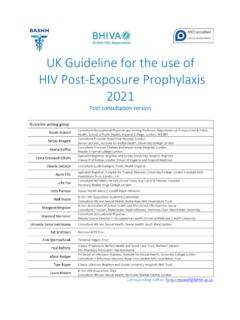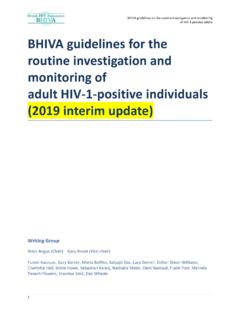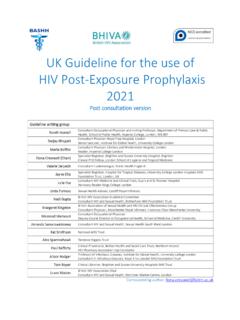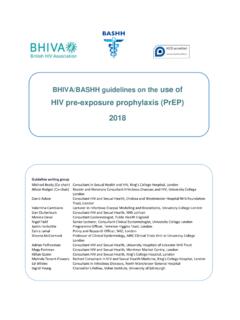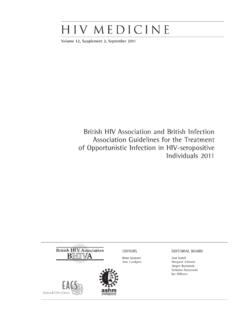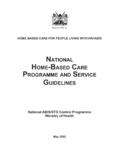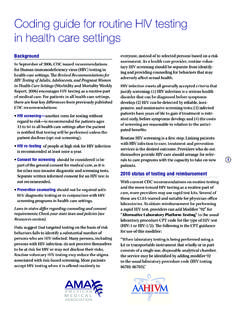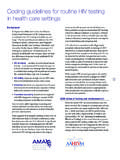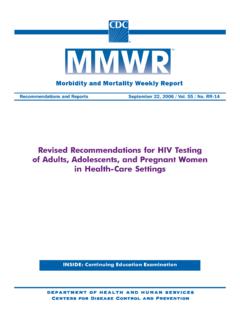Transcription of Standards of Care for People Living with HIV - …
1 british HIV association Standards of care for People Living with HIV. 2013. british HIV association Standards of care for People Living with HIV. 2013. in partnership with british association for Sexual Health and HIV (BASHH). british Infection association (BIA). british Psychological Society (BPS). Children's HIV association (CHIVA). Dietitians working in HIV/AIDS (DHIVA). Faculty of Public Health (FPH). Health Protection Agency (HPA). HIV Pharmacy association (HIVPA). Local Government association (LGA). National HIV Nurses association (NHIVNA). Rehabilitation in HIV association (RHIVA). Royal College of General Practitioners (RCGP). Royal College of Nursing (RCN). Royal College of Physicians (RCP). Social care Institute for Excellence (SCIE). BHIVA Standards of care for People Living with HIV. C H I L D R E N ' S. H I V A S S O C I A T I O N.
2 Supported by british HIV association Standards of care for People Living with HIV. All rights reserved. No part of this publication may be translated, reproduced, stored in a retrieval system or transmitted in any form by any means, electronic, mechanical, photocopying, recording, broadcasting or otherwise, without prior permission. All images for illustrative purposes only and all persons depicted in this publication are models. british HIV association 2012. First published November 2012. Published by Mediscript Ltd 1 Mountview Court, 310 Friern Barnet Lane, London N20 0LD UK. Printed by Impress Print Services Ltd, UK. Designed by Lisa Bibby ISBN: 978-0-9551669-4-5. BHIVA Standards of care for People Living with HIV Contents II. Introduction and 1. 12 Standards of care for People Living with HIV. Standard 1: HIV testing and Standard 2: Access to, and retention in, HIV treatment and 13.
3 Standard 3: Provision of outpatient treatment and care for HIV, and access to care for complex Standard 4: Safe ARV prescribing: Effective medicines 25. Standard 5: Inpatient care for People Living with Standard 6: Psychological Standard 7: Sexual health and identification of contacts at risk of 41. Standard 8: Reproductive Standard 9: 51. Standard 10: Participation of People with HIV in their 55. Standard 11: Standard 12: Information for public health surveillance, commissioning, audit and Appendix 1: Appendix 2: The NHS Outcomes Appendix 3: Glossary of terms and Appendix 4: 91. BHIVA Standards of care for People Living with HIV. Foreword The british HIV association (BHIVA), working in partnership with care providers, professional associations, commissioners and People Living with HIV, has produced a set of quality Standards for the care of People with HIV in the UK.
4 They cover 12 key themes, prioritised as being the most important issues for the care of People with HIV. Derived from the best available evidence, the Standards focus on aspects of care that have particular relevance for delivering equitable high-quality services that secure the best possible outcomes for People with HIV. Why has BHIVA developed these Standards ? In the three decades since the identification of HIV, progress in treatment and care has been enormous, with substantial improvements in both clinical outcomes and the lives of People Living with HIV. Treatment outcomes for People with HIV in the UK. are amongst the best in the world, which, despite current financial pressures, must be sustained and enhanced as new structures emerge within an evolving NHS. The Standards provide a reference point against which to benchmark the quality of HIV.
5 care . This will be especially important as new providers and commissioners enter the health economy in April 2013. Positioned alongside national and local policy and commissioning initiatives, we believe that the Standards will provide a framework to inform and support commissioning decisions both within and outside the NHS. Who is the intended audience for the Standards ? We believe that the Standards will be particularly relevant to anyone involved in the provision of services for People with HIV, with clear information on what is required and why, together with ways of measuring and auditing performance. For those with responsibility for the commissioning of services that will affect People with HIV these new Standards will be a critically important resource, as innovative and informed commissioning decisions will be required to meet the growing need for more efficient and cost-effective services.
6 The Standards will be an important information source for the new policy and commissioning framework for HIV-related services at national and local levels, including the national HIV service specification that is in development with the National Clinical Reference Group and the payment-by-results system of currency and tariffs for HIV treatment and care . BHIVA Standards of care for People Living with HIV Introduction II. People with HIV should expect to have equitable access to consistently high-quality care no matter where they live. The Standards will inform People with HIV, their carers and those who advocate on their behalf about the care that People should expect to be able to access. What do the Standards cover? The Standards cover the range of care needed by People with HIV from the time they first receive a diagnosis of HIV. Standard 1 (HIV testing and diagnosis) promotes testing strategies that aim to reduce the proportion of People Living with HIV who are unaware of their diagnosis or who present with advanced infection.
7 Following a diagnosis of HIV, it is essential that People are able to access (and be retained in) specialist HIV care , highlighted in Standard 2 (Access to, and retention in, HIV. treatment and care ). As People with HIV live longer, their health needs change, and both the numbers of comorbidities and the complexity of prescribing for multiple health conditions increases. Standards 3 and 5 focus on key aspects in the delivery of high-quality outpatient and inpatient care for HIV services, ensuring that all People have equitable access to high Standards of care wherever they live. People with HIV need to be confident that appropriate systems are in place to ensure that ARVs are prescribed and monitored safely (see Standard 4, Safe ARV prescribing: Effective medicines management). Within Standard 4 there is a further commitment for HIV services and patient representatives to work in partnership with commissioners to develop strategies that facilitate cost-effective prescribing.
8 Dealing with issues of disclosure ( to new sexual partners, those who may have been at risk of inadvertent exposure to HIV infection, and other health care professionals) is far from easy and can take its toll on psychological and emotional well-being. Standards 6 and 7 recognise the importance of providing care that promotes the mental, emotional and cognitive well-being of People Living with HIV, and covers the important and complex area of disclosure to, and testing for, potential contacts of infection. Standards 7 and 8 are about supporting People with HIV in establishing and maintaining healthy sexual lives for themselves and their partners, and ensuring high- quality reproductive and family health. Living well with HIV for the long term calls for strong self-management skills, education and engagement with peer support (Standard 9), together with participation in decisions about all aspects of treatment and care , service design and delivery (Standard 10).
9 People Living with HIV should BHIVA Standards of care for People Living with HIV Introduction III. expect to be treated by health care professionals who are up-to-date and fit to practise safely. Standard 11 sets out the competencies that may be involved with delivering care for a range of practitioners. Some of the key learning that has driven quality improvements in the care of People Living with HIV has been derived from national surveillance data, audit and research. Standard 12 places a duty on all HIV services to maintain data security and to contribute information to maximise understanding of the HIV epidemic in the UK. We are at a point where there is a real possibility that People with HIV can look forward to a life expectancy that approaches that of the general population. Putting the needs of People Living with HIV at the centre of service design and delivery will minimise morbidity and allow life to be lived to the full.
10 Implementation of these Standards will be a major step in transforming these aspirations into a reality for People Living with HIV in the UK. Professor Jane Anderson, Co-Chair Dr Simon Edwards, Co-Chair BHIVA Standards of care for People Living with HIV Introduction IV. Acknowledgements The project partners are grateful for the support and guidance of all the members of the Standards Working Group. Particular thanks go to those members who gave their time, energy and expertise to the drafting and redrafting of substantial sections of the document: Dr David Asboe, Mr Simon Collins, Dr Valerie Delpech, Dr Martin Fisher, Dr Stuart Gibson, Professor Saye Khoo, Dr Nicola Mackie, Dr Adrian Palfreeman, Dr Karen Rogstad, Mr Paul Ward, Dr Ed Wilkins and Dr Ian Williams. Without their enthusiasm, dedication and expertise, this publication would not have been realised.
